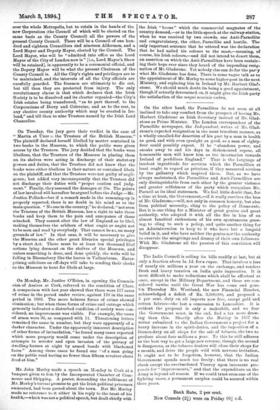On the other hand, the Parnellites do not seem at
all inclined to take any comfort from the prospect of having Mr. Herbert Gladstone as Irish Secretary instead of Mr. Glad- stone as Prime Minister. The London correspondent of the Parnellite newspaper, the Independent, writes of Mr. Glad- stone's expected resignation in the most truculent manner, as a wholly uncalled-for desertion of his post by a man in health as good, and with even eyesight as good, as a man of eighty- four could possibly expect. If he "abandons power, and sneaks away to end his days in dishonoured repose, all honourable men will know him as the incarnation towards Ireland of perfidious England." That is the language of insolent ingratitude for services which the Parnellites at least ought to regard as priceless, if they measured services by the gallantry which inspired them. Bat, as we have always maintained, the Parnellites and Anti-Parnellites are only distinguishable from each other by the greater violence and greater selfishness of the party which recognises Mr. Parnell as its ideal statesmen. We feel little doubt that, for a time at least, the Government,—if it really survives the loss of Mr. Gladstone,—will, not only in common honesty, but also from political necessity, cling to the policy of Home-rule. But it is one thing for a Minister of great genius and great authority, who adopted it with all the fire in him of an almost fanatical enthusiasm of his own spontaneous grow- ing, to cling to such a policy, and quite another thing for an Administration to keep to it who have but a languid belief in it, and who have neither the genius nor the authority to overrule the misgivings and dismay of their own followers. With Mr. Gladstone all the passion of this conviction will disappear.






































 Previous page
Previous page